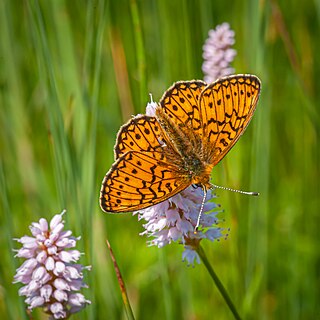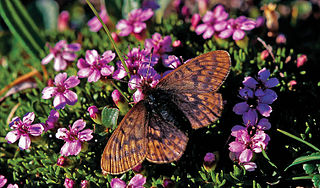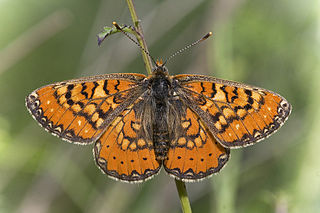Description
The wingspan is 35–48 mm. The upperside is orange with brown basal suffusion and sometimes even purplish gray in the female, decorated with brown designs, with small scallops and a line of submarginal round dots. The hindwing forms an angle at its anterior edge.
On the forewing undersides the patterns are little marked, the apex is adorned pearly spots, and the hindwing undersides are clear because they are adorned with pearlescent designs.
The butterfly flies from June to August depending on the location.
In Europa the larvae feed on Viola species, especially V. biflora and also Polygonum viviparum . In North America it also feeds on Polygonum bistortoides .

Melanargia galathea, the marbled white, is a medium-sized butterfly in the family Nymphalidae. Despite its common name and appearance, this butterfly is one of the "browns", of the subfamily Satyrinae.

Aporia crataegi, the black-veined white, is a large butterfly of the family Pieridae. A. crataegi is widespread and common. Its range extends from northwest Africa in the west to Transcaucasia and across the Palearctic to Siberia and Japan in the east. In the south, it is found in Turkey, Cyprus, Israel, Lebanon and Syria. It is not usually present in the British Isles or northern Scandinavia.

The heath fritillary is a species of butterfly in the family Nymphalidae. It is found throughout the Palaearctic from western Europe to Japan, in heathland, grassland, and in coppiced woodland. Its association with coppiced woodland earned it the name "woodman's follower" in parts of the UK. It is considered a threatened species in the UK and Germany, but not Europe-wide or globally.

The Scotch argus is a butterfly of the family Nymphalidae. In spite of its English name argus, it is not a close relation of the brown argus nor the northern brown argus.

Colias hyale, the pale clouded yellow, is a butterfly of the family Pieridae, which is found in most of Europe and large parts of the Palearctic. It is a rare migrant to the British Isles and Scandinavia. The adult wingspan is 52–62 millimetres (2.0–2.4 in).

The purple-shot copper is a butterfly in the family of the Lycaenidae or copper butterflies and in the genus of the Lycaena.

Melitaea diamina, the false heath fritillary, is a butterfly of the family Nymphalidae.

The purple-edged copper is a butterfly of the family Lycaenidae.

Coenonympha arcania, the pearly heath, is a butterfly species belonging to the family Nymphalidae.

Boloria dia, the Weaver's fritillary or violet fritillary, is a butterfly in the family Nymphalidae. The name Weaver's fritillary is in honor of Richard Weaver, an English insect collector who claimed to have obtained the specimen within ten miles of Birmingham around 1820. However, B. dia is very rare in England and the few specimens known from there are thought to be from possibly accidental introductions.

Boloria eunomia, the bog fritillary or ocellate bog fritillary is a butterfly of the family Nymphalidae.

Boloria titania, the Titania's fritillary or purple bog fritillary, is a butterfly of the subfamily Heliconiinae of the family Nymphalidae.

Melitaea didyma, the spotted fritillary or red-band fritillary, is a Palearctic butterfly of the family Nymphalidae.

Melitaea trivia, the lesser spotted fritillary, is a butterfly of the family Nymphalidae, part of the sub-family Nymphalinae.

Plebejus argyrognomon, common name Reverdin's blue is a butterfly of the family Lycaenidae. The species is named after Jacques-Louis Reverdin.

Boloria improba, the dingy fritillary, is a butterfly of the family Nymphalidae. In Europe it is only found in small parts of Scandinavia, more specifically the border region between Norway, Sweden and Finland. It is found in alpine or tundra habitats.

Boloria pales, the shepherd's fritillary, is a butterfly of the family Nymphalidae. It is found from the Cantabrian Mountains and the Pyrenees through the Alps and Apennine Mountains east to the Balkan, Carpathian Mountains, the Caucasus and central Asia up to western China.

The Balkan fritillary is a butterfly in the family Nymphalidae found in the southern Central Alps and the mid- to high-altitude Balkans. The larva feeds on Viola species.

Euphydryas desfontainii, the Spanish fritillary, is a species of butterfly in the family Nymphalidae. It is found in France, Portugal, Spain, Morocco and western Algeria in North Africa.

Euphydryas iduna is a small butterfly found in the Palearctic that belongs to the browns family.
























